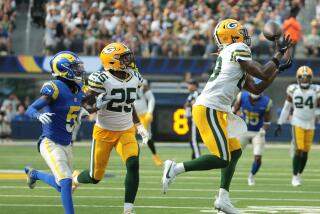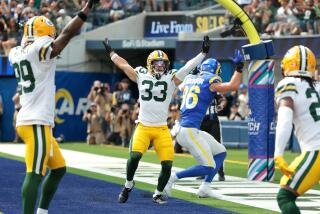ANALYSIS : A Season Gone Wrong Shakes Ram Alliance : Pro football: After seven years of harmony, the relationship between Robinson and the front office strikes a discordant note.
They walked together into this, if not hand in hand, at least bonded by a shared idea of where they were going and how they were going to get there.
They walked together for seven mainly happy seasons, John Robinson and the Rams’ front office, and where they walked, victories, canny trades and ever-mounting optimism usually followed.
Finally, after getting to the NFC championship game last season, capping their sixth playoff appearance in seven years, Robinson and the front office agreed that 1990 should be the crowning year of the era.
They were wrong. Now, the fallout.
Instead of being a triumphal parade, 1990 has been a journey into disaster. It might prove to be the permanent splintering of the fragile balance between Robinson and the front office, headed by Executive Vice President John Shaw.
After seven years of public harmony, criticism leveled at both sides appears to have strained the relationship, and Shaw apparently has kept his distance from his coach this season, to see how Robinson reacts. Robinson, who hadn’t heard these whispers before, already has conceded that he might be in trouble and could be scanning the league for other possibilities.
“Robinson has never been too cool under pressure, has he?” one NFC coach said Wednesday. “Let’s see how he handles this one.”
It has all the makings of a power struggle caused by seven years of high hopes gone bad. And the question of whether Robinson will coach the Rams in 1991 suddenly is up in the air--to be decided by a front office increasingly bothered by his actions.
In victory, the front office benignly tolerated--even encouraged--Robinson’s hogging the spotlight, holding court, oftentimes subtly undermining management along the way. In victory, Robinson quietly accepted the front office’s habit of keeping the hard line on player contracts and its insistance on control over the draft and other personnel decisions.
In victory, the tense balance held. But 5-8, the current Ram record, is not victory.
Shaw has said he and owner Georgia Frontiere will review all aspects of the team at the end of the season, has included Robinson in that review and has declined to give Robinson a vote of confidence for the remaining year on his contract.
Disappointing football seasons are always the Rorschach tests of sports--you see what you want to see in them. Bad breaks? A pattern of wrong-headed money decisions? A talented team tied to a coach who hasn’t won the Big One? A team that got lucky last season and is paying the price for it now?
Whatever you want to see in this Ram stumble, you see.
But it appears clear that what Shaw and the rest of the Ram administration see in Robinson is not quite to their liking.
“If he spent as much time coaching the team as he does running around trying to deflect the blame in other directions, we’d have been one of the elite teams this year,” one executive said recently.
Asked for an example of how Robinson undermines the front office, he offered a story.
At the end of last season, the administrator said, Robinson clamored for the team to get rid of back-to-back 1,000-yard rusher Greg Bell because he thought Bell wasn’t his kind of running back and he was sure Cleveland Gary and Curt Warner could do just as good a job.
But when Shaw accommodated him, trading Bell to the Raiders and giving the since-waived Warner a $700,000 contract, Bell accused the front office of yet another salary-inspired banishment at the cost of quality, and said Robinson’s chances of winning a Super Bowl were being crippled by Shaw’s penny-pinching.
Some in the front office say that Robinson, as a way of pulling the public in his favor, told Bell it was all a money problem instead of his own problem with the player--knowing that Bell would air it out publicly.
Ram administrators also insist, privately, that the big-money, market-value signings of linebacker Kevin Greene and receiver Henry Ellard this season prove that they pay for performance.
The Rams claim they now rank in the top half of league payrolls, possibly in the top 10. According to the NFL Players Assn.’s latest salary survey, they rank 20th, with a 1990 base payout of $16,659,500. Important fact: the NFLPA’s survey does not include either Greene’s deal, which will pay him about $800,000 this season, or the half-eaten Warner contract.
It may not really matter how much of the Bell story is true, just that Ram executives believe it--plus a handful of similar stories.
And privately, they wonder if the team would be better off without a coach who has his own public relations agenda? Is it worth it if, after eight seasons, the team is languishing at the bottom of the NFC?
The Rams understand the value of a coach who is a marvelous--and for seven seasons, the only --spokesman for the team. Robinson has kept the attention on himself and away from where Shaw doesn’t want it--on Shaw. Robinson knows his role and plays it well.
But Shaw, who has spoken sporadically with reporters this year, is aware that by having Robinson as the team’s only spokesman, everything that comes out has Robinson’s spin, his way of winning over the media. While Robinson has gained by being so accessible, the usually unavailable Shaw has been torched.
On Tuesday, Robinson declined a request for an interview concerning the failings of 1990 and looking ahead to what might come in the off-season, saying he wanted to concentrate only on the next three games. Shaw has been unavailable for comment the past several days.
But clearly, each of the crisis points of 1990 has served only to heighten the tension between the two, pushing Shaw and Robinson in different directions.
Some of them:
--The defensive decline can be traced to the team’s inability to find an impact player in the draft, despite having 10 premium choices in two drafts after the 1987 midseason trade of Eric Dickerson to the Indianapolis Colts in a three-way deal with the Buffalo Bills. The Rams got three No. 1 choices and three No. 2s and had four other choices of their own in those two drafts.
But instead of ending up with Michael Dean Perry (whom they bypassed five times in 1988) or anybody who could earn a Pro Bowl spot, the Rams drafted six defensive players, ranging from disappointments (1989 second-round defensive lineman Brian Smith, 1989 first-rounder Bill Hawkins) to solid but unspectacular contributors (1989 second-round inside linebacker Frank Stams, 1988 second-round safety Anthony Newmann).
The Rams’ draft hierarchy has always been vague in the public consciousness: Does Shaw make the picks, or does player personnel director John Math or does Robinson? And no one is stepping up to assume responsibility for this batch.
After this season, it is unlikely that Robinson can gain more of a draft power base if he remains, and after Gary’s fumbling problems, he might even have less.
--Robinson retooled their basic 3-4 defense this season around the expectation that Smith and Hawkins were ready to blossom in the middle of a four-man line. But partially because of injuries and holdouts, the defense never jelled.
Was the front office to blame for not getting Greene and defensive end Doug Reed into camp soon enough? Did Robinson stick with his defense too long when he never had the training camp time or the right players to implement it?
Ram coaches now concede that they had hoped for too much, and agree that the scrappy defense that got them to the NFC championship game last season was working more on fortitude than on talent. Instead of a tuneup, it might have been due for some major reconstruction.
Then the next question: Would Shaw pay the money it would take to, say, go after a high-priced protected free agent, or to wade heavily into the Plan B market?
The front office is known to be uncomfortable with the soft zone method used by defensive coordinator Fritz Shurmur, but without the talent level, it is hard to imagine the Rams being any more successful in another defense.
Still, it is possible that, as a condition of Robinson’s being brought back for 1991, Shaw could ask him to replace one or more of his defensive assistants--more as one-year scapegoats than anything else.
--Because of their 26-points-a-game average in 1989, the Rams generally assumed that the offense would again score 30 points a game in 1990.
But this season, put in similar jams, the offense hasn’t been as productive and has endured some huge turnovers--Gary’s seven lost fumbles leading the way.
Shaw probably is aching to see Gaston Green in a more active role in the offense.
So here the Rams stand, wobbly and not so together, after taking seven seasons to reach what had appeared to be the brink of the Super Bowl.
And of the countless things you can see in the ink blots of the Rams’ 1990 season, a calm off-season is not one of them.
More to Read
Go beyond the scoreboard
Get the latest on L.A.'s teams in the daily Sports Report newsletter.
You may occasionally receive promotional content from the Los Angeles Times.










